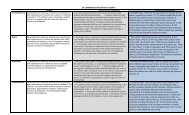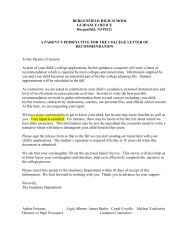Create successful ePaper yourself
Turn your PDF publications into a flip-book with our unique Google optimized e-Paper software.
AP Psychology Summer 2012 Assignment<br />
Welcome to AP Psychology! I am ecstatic that you have decided to join this class and chose to<br />
challenge yourself with the fascinating world of psychology. I am certain that you will find this course<br />
worthwhile and personally relevant. Although it is the summer, there is work to be done. Please note,<br />
AP Psychology is an elective, college-level course with higher student expectations than most<br />
courses taken by high school students.<br />
With that being said, it is imperative that we get a jump start on the AP Psychology curriculum. It is<br />
mandatory and, in your best interest to complete the summer assignment. Your summer assignment<br />
is comprised of THREE mini-assignments. Each assignment will serve a specific purpose that will<br />
assist you throughout the school year year and aid in your preparations for the AP exam in May.<br />
Assignment #1 -<br />
For this assignment, you are required to answer the following questions in complete sentences. This<br />
assignment is to be emailed to me at nfernandez@bergenfield.org before August 28th. In this email,<br />
please make note of what period you are enrolled in AP Psychology.<br />
* Why are you taking AP Psychology?<br />
* What are your goals/plans post-high school?<br />
* What other AP courses are you enrolled in?<br />
* Are you involved in an extra-curricular activities? If so, which ones?<br />
* What else should I know about you so that I have insight into you as a person before the next<br />
school year begins. [This gives me an opportunity to get to know you before the start of<br />
class.]<br />
Assignment #2 -<br />
After surveying last year’s students, it was brought to my attention that more time should be focused<br />
on the individual people of the world of psychology. For this assignment, you are to acquire 50 index<br />
cards (3x5 or 4x6) for the 50 people listed below.<br />
On the front of each index card, you are to write the name of a theorist. Example is shown below.<br />
<strong>Sigmund</strong><br />
<strong>Freud</strong><br />
1
On the back of each index card, you are to write:<br />
a. years alive<br />
b. what areas of field of psychology did they work or focus on<br />
c. which research/theories/findings did they contribute to the field of psychology.<br />
d. source; where did you get this information from? Wikipedia does not count.<br />
1. <strong>Sigmund</strong> <strong>Freud</strong><br />
2. J. Ridley Stroop<br />
3. Carl Jung<br />
4. Erik Erikson<br />
5. Lawrence Köhlberg<br />
6. Carol Gilligan<br />
7. William James<br />
8. William Wundt<br />
9. BF Skinner<br />
10. John B. Watson<br />
11. Jean Piaget<br />
12. Harry Harlow<br />
13. Carl Rogers<br />
14. Abraham Maslow<br />
15. Karen Horney<br />
16. Alfred Adler<br />
17. Gordon Allport<br />
18. Herman Rorschach<br />
Years: 1919-1934<br />
Field: Psychoanalysis<br />
Contributions: Father of psychoanalysis,<br />
developed psychosexual stages of<br />
development, the id/ego/superego and dream<br />
interpretation. Used free association, dreams,<br />
& <strong>Freud</strong>ian slips to tap the unconscious mind<br />
Source: www.nimh.org<br />
*** All cards must be handwritten. I highly recommend punching a hole in one corner of your cards<br />
and using a metal ring or other fastener to keep your cards together. This is due on the FIRST DAY<br />
OF CLASS. ***<br />
19. Solomon Asch<br />
20. Stanley Schachter<br />
21. Stanley Milgram<br />
22. Philip Zimbardo<br />
23. Elizabeth Kübler-Ross<br />
24. Elizabeth Loftus<br />
25. Robert Sternberg<br />
26. Albert Bandura<br />
27. Raymond Cattell<br />
28. Aaron Beck<br />
29. Noam Chomsky<br />
30. Edward Thorndike<br />
31. HJ Eysenck<br />
32. Mary Ainsworth<br />
33. Kenneth Clark<br />
34. Martin Seligman<br />
35. Howard Gardner<br />
36. Kurt Lewin<br />
37. Ivan Pavlov<br />
38. Lee Vytgotsky<br />
39. Hermann Ebbinghaus<br />
40. Robert Rosenthal<br />
41. Benjamin Whorf<br />
42. Lenore Jacobson<br />
43. Judith Langlois<br />
44. David Rosenhan<br />
45. Daniel Goleman<br />
46. Charles Spearman<br />
47. Albert Ellis<br />
48. Harry Stack Sullivan<br />
49. Robert Yerkes<br />
50. Alfred Binet<br />
2
Assignment #3 -<br />
The third, and final assignment will incorporate some technology. In iTunes, there is a section labeled<br />
iTunesU. In this, you will find a wide variety of scholarly media in all subject areas. This summer, I<br />
would like you to pick any FOUR lectures under the “Introduction to Psychology” by Professor Jeremy<br />
Wolfe from MIT. After listening to these lectures, you will provide a one paragraph summary<br />
consisting of at least seven sentences. Feel free to incorporate your opinion of the lecture and<br />
discuss terms you were interested in, as well as terms you were unsure about.<br />
As I stated earlier, feel free to contact me throughout the summer at nfernandez@bergenfield.org. I<br />
look forward to working with all of you this September. Keep in mind that psychology is everywhere.<br />
Everything we do, think, and feel can be related back to psychology.<br />
Have a great summer! ☺<br />
- Mr. Fernandez<br />
3





